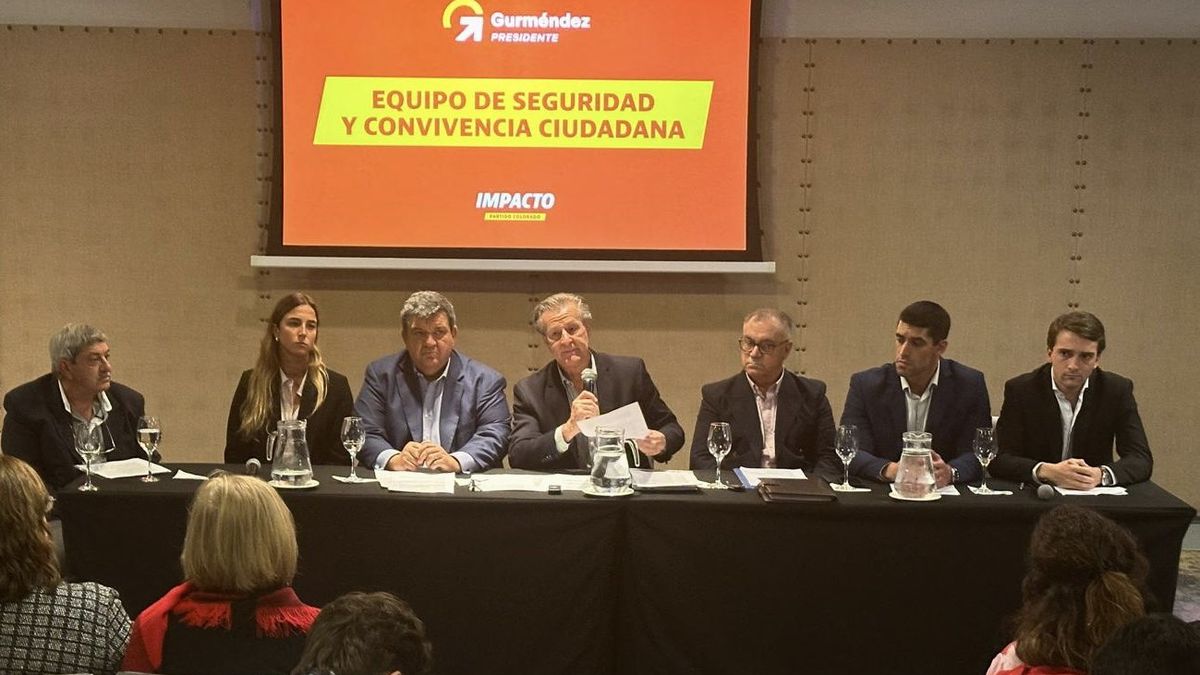The presidential candidate for Colorado Party and former president of Antel, Gabriel Gurmendezpresented this Wednesday the five proposals that he considers “of great impact” against insecurity in the Uruguay which include from the implementation of a Super ministry until the implementation of more prisons.
The candidate described them as “five measures of great impact” among which are the creation of a Super ministry of the Interior, the fight against money laundering and drug trafficking, the creation of more prisons, the prosecution of cybercrime and the modification of the National Rehabilitation Institute (INR) and the National Directorate of the Liberated (Dinali).
The details of the new ministry
Regarding the creation of the super ministry, Gurméndez proposed a portfolio with “more than 1,500 members of the National Naval Prefecture, which are personnel of a police nature, placed at the immediate and effective disposal of the fight against organized crime.” “We want to have a single command, where all the resources found in different departments of the State in terms of information, investigation and intelligence to prioritize this fight,” he added.
On the other hand, he assured that 200 troops from the Aeronautical Police. In this way, the structure would have “a centralized and unified command capacity for the resources dispersed in different offices, including the control and supervision of the work carried out by the Customs in the port scanners, which must be reinforced, and also in regard to the intelligence of the State”.
Embed – https://publish.twitter.com/oembed?url=https://twitter.com/ggurmendez/status/1780934980077588862&partner=&hide_thread=false
We Uruguayans cannot naturalize cruelty, violence, we cannot allow our people to not be able to live together in peace.
That is why we propose 5 measures of IMPACT
Creation of a “Super Ministry of the Interior” adding 1,500 members of the Prefecture to fight… pic.twitter.com/F0HUnLlAxQ
— Gabriel Gurméndez (@ggurmendez) April 18, 2024
Targeted drug trafficking
The proposal to combat money laundering is directly related to their intention to perpetrate the crime. drug trafficking in Uruguay. “Drug trafficking is the main enemy of Uruguayans: it kills in the streets and poisons our young people,” he lamented.
In that sense, he proposed “striking drug trafficking on the chin in the place where it hurts the most.” “These organized criminals do this for money, the luxury life, the mansions, the high-end cars: we want to go after the money route and fight these criminals in their pocket,” he explained.
More prisons and focus on rehabilitation
Meanwhile, he also proposed “the construction of three prisons with a capacity of 500 people each, where prisoners are classified based on whether people with serious crimes do not live with people with minor crimes.” “We do not want a university of crime,” which would be financed through the Public-Private Participation (PPP).
On the other hand, he proposed the decentralization of the INR and Dinali. “We put an important focus on rehabilitation. We have to protect Uruguayan families from the majority of prisoners who are released, who return to kill, to rob, to take drugs. For that, the rehabilitation effort is very important,” he assured.
“We propose that the National Rehabilitation Institute get out of Ministry of Interior and move to a decentralized service. We believe that it is better to merge the work of the INR and of the National Directorate of the Released in a decentralized service, without creating more ministries,” he said.
Separate chapter for cybercrime
With respect to cybercrime The candidate proposed the “urgent” regulation of the same. ““The world is becoming more technological every day and the types of crime due to the application of technology are growing. The priority will be to classify the crimes of illicit access to computer systems, computer damage, computer fraud and digital identity theft,” he explained.
“We will create a Cybercriminal Registry and a Specialized Prosecutor’s Office to adequately deal with these technical issues. We will strengthen the Cybercrime Unit to be able to prosecute the commission of these crimes. We will regulate digital evidence and create the figure of the digital undercover agent. We must provide the same legal security in the electronic world as in the analogue world,” he proposed.
Source: Ambito




